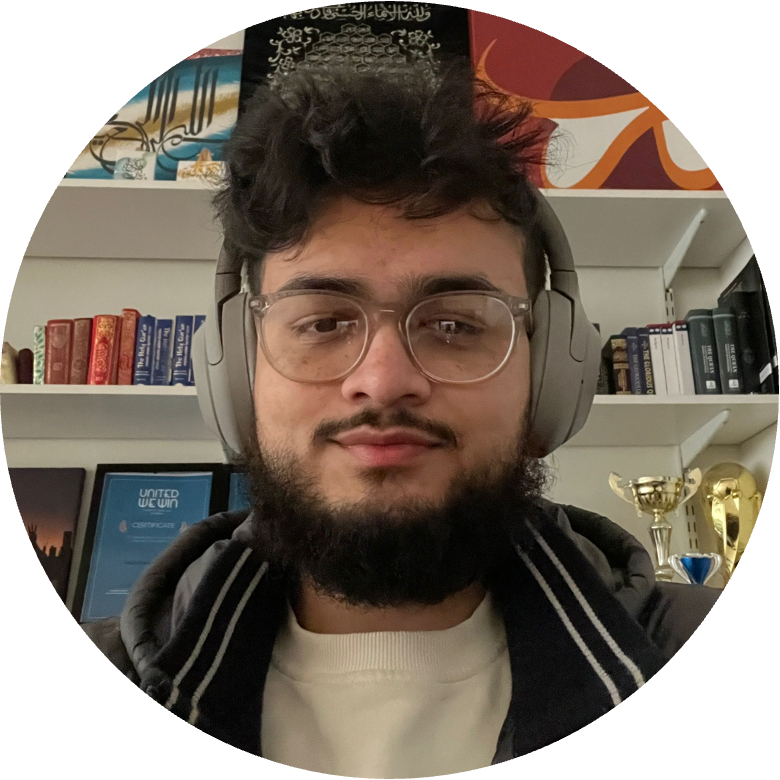
Relaunched in 2022, the society has quickly built up a reputation for having exciting events from hosting TechSummit - the UK’s biggest student entrepreneur career fair, to running multiple hackathons (e.g. HackKing’s, FirstYearHack) as well as providing weekly workshops and talks with industry. What’s more, all of our events are free.
Each week sees one of our specialism heads (representing AI, Blockchain, Cloud, Cybersecurity, Data Science, Engineering, Media, Gaming, FinTech, HealthTech, and more) take over the society to promote their area of tech through events and media.
The society has quickly become the go to place for connecting with students interested in tech, with multiple opportunities shared through us each week, and now with the launch of our Opportunity Board, students know our website is the first place to look. Contact us at contact@kcltech.co.uk.

Students from King's College London, coming from a range of backgrounds, passionate about all areas of technology from AI to IoT.

We connect students and industry, organise events and workshops to develop skills and expertise relevant to current tech trends.

Any KCL Student can become a member for free here. Stay Connected by following our Social Media and signing up to our Newsletter.
Executive Team

Suliman Kalim Sattar
MSci Computer Science
4th year

Maneet Sigtia
BSc Computer Science with a Year in Industry
2nd year

Charlotte (Charlie) Leong
BSc Computer Science
3rd year
Events Team

Khalid Al-Talib
BSc Computer Science
3rd year

Arjun Sharma
MEng Electronic Engineering
2nd year

Jieun Lee
MEng General Engineering
3rd year
Marketing Team

Shayna Gail A. Velasquez
MSci Computer Science
2nd year

Ekaterina (Katya) Hunter
MSci Computer Science
2nd year

Ashwina Kalanathan
BSc Computer Science (AI)
2nd year

Akshat Dubey
BSc Computer Science
2nd year
Specilism Heads

Vrinda Chopra
BSc Computer Science
2nd year

Sanchusri Kavitha babu
BSc Computer Science (AI)
2nd year

Minseok Ryu
BSc Neuroscience and Psychology
2nd year

Ra’ad Kawasme
BEng Biomedical Engineering
3rd year

Neel Suroop Nair
BSc Computer Science With a Year in Industry
2nd year

Ismail Doghri
BSc Computer Science with Management
3rd year

Shakib Chowdhury
BSc Neuroscience
2nd year
10 core committee members
(50% Female)
8 specilism heads
24 specilists
Overall 40% Female
7 different degree areas
AI is the science and engineering of making intelligent machines, especially intelligent computer programs. AI refers to the simulation of human intelligence in machines that are programmed to think like humans and mimic their actions. A computer system that perform tasks that mimic human intelligence. Artificial intelligence is all around us. From music preferences to home appliances and healthcare, the power of AI is far reaching.
Artificial Intelligence (AI) influences almost every aspect of our lives. This exciting technology is used across a wide range of industries. AI inspires students to generate ideas and solutions, fostering creativity and innovation, developing digital literacy, critical thinking skills, and preparing students for future academic and career success. Helps gather reliable and valuable insights at a much faster pace. Helps you keep up with trends, making your daily tasks and work more efficient. The third industrial revolution in the world might come with artificial intelligence. Learning AI can change your life at such a crucial juncture.
1. Training programs : practical experience in AI development (Bootcamps)
2. Volunteering : (in projects)
3. Research internships : industrial experience
4. Online courses : enhance programming Language
5. Networking and mentorship : connect with professionals and develop soft skills
6. Study groups
7. Conduct research, start a project
8. Take part in Hackathons and AI-related events
AI engineer - Build AI models from scratch and help product managers and stakeholders understand results.
Machine learning engineer - Using data to design, build and manage ML software applications.
Data scientist - Collect, analyse and interpret data sets.
Software engineer - Develop programs in which AI tools function.
Robotics engineer - Design, build and test robots or robotic systems.
Data engineer - Develop systems that allow businesses to communicate and collect data
Research Scientist - Expert in applied math, machine learning, deep learning, and computational stats.
Big data analyst - Find patterns in data by looking at the past to help make predictions about the future.
Researcher - Work with computer science and AI research Discover ways to advance AI technology
https://aimagazine.com https://time.com/tag/artificial-intelligence/
CYBERSECURITY : protection of computer systems & networks from attack by malicious actors that may result in unauthorised information disclosure, theft of, or damage to data, software, or hardware
1. Societal value in helping others
2. Top £££
3. Job security in strong market as specialists
4. Growing demand in a dynamic, industry-agnostic landscape
5. Hack The World! Freedom For All!
1. EXPERIENCE : Internship, Placement (e.g GCHQ)
2. NETWORKING : Conference, Expo, Summit (e.g Defcon)
3. PERSONAL PROJECT : Reverse-Engineering Programs, Hacking Cyberdeck, Cryptographic Algo Implementation
4. COMMUNITY : Bug Bounty
CRYPTOGRAPHER : writes (or cracks) the encryption code used for data security; uses number theory, combinatorics, linear algebra
ETHICAL HACKER : researching the company's system, network structure, and possible penetration sites. Conducting multiple penetration tests on the system.
CYBERSECURITY ANALYST : identify and assess security risks, analyse security data, and develop and implement security strategies to protect an organisation's technology infrastructure and data.
CYBERSECURITY ARCHITECT : planning, designing, testing, implementing and maintaining an organisation's computer and network security infrastructure.
CISO : developing and driving a cyber security strategy and framework that is intended to secure an organisation's technology assets. Ensuring that a company's IT infrastructure is secure, investigating security incidents and working with other members to ensure that the IT department and all employees are following best practices.
SIMPLY CYBER : https://www.simplycyber.io/
DARKNET DIARIES : https://darknetdiaries.com/
Data Science is the field of extracting actionable insights from data sources using a combination of Mathematics/Statistics and programming techniques. This field is becoming increasingly more important as companies have a gargantuan amount of data to process. Hence, data science aims to clean, format, model and interpret data. There are a few uses to data science, including describing datasets, diagnosing to understand a certain pattern found in the dataset, predictive analysis and prescriptive analysis.
Harvard Business Review called Data Science roles the "Sexiest Job of the 21st Century". There are countless of opportunities available for data scientists, and they are not tied to tech organisations. You can work in financial institutions analysing the risk involved in investing a portfolio. You can also use machine learning to help develop wearables that track a patient's health.
Internships, a portfolio of work, Kaggle competitions, research
Engineering is the application of scientific and mathematics principles to find innovative solutions to real-life problems. It involves the use of various software and hardware such as computer aided design (CAD) to create detailed models of structures and machinery in addition to AI to analyze data and improve the performance of a systems. The sole purpose of engineering is to improve the quality of life for everyone and push forward the development of humanity.
Engineering is a constantly evolving field that always leaves significant impact on our world. Additionally, Engineering has a vast variety of specialized fields so no matter what interests you, you are very likely to be able to incorporate it with engineering. For instance, if you like chemistry, there is chemical engineering. For those that like healthcare such as myself there is biomedical engineering, or perhaps you like working with computer tech you can get into computer engineering. Moreover, by joining the engineering field you’d learn how the technology surrounding you works as engineering involves continuously exploring sciences and technology. Furthermore, by contributing to the engineering field you can contribute to society by helping us build a more sustainable and comfortable future and advancing humanity forward.
Internships, volunteer work, making projects, and networking ( attending engineering events, conferences, workshops,etc), joining research.
?
NHS scientist training program(STP) : https://nshcs.hee.nhs.uk/programmes/stp/ (clinical engineering)
Rolls Royce: https://careers.rolls-royce.com/united-kingdom/search-and-apply (Various engineering)
Siemens: https://jobs.siemens.com/jobs (Various engineering)
Gaming refers to interactive entertainment where users play video games that provide visual feedback on a screen. In the context of computer science, gaming involves various elements such as design, programming, graphics, storytelling, and user experience. It covers a broad range of genres and platforms, including PC, consoles, mobile devices, and virtual reality systems.
Working in the gaming industry can be highly rewarding for several reasons.
First, if you have a passion for gaming and enjoy playing games, a career in this field allows you to turn your hobby into a fulfilling profession.
Second, it provides an avenue for creative expression, enabling you to design unique worlds, characters, and compelling narratives.
Additionally, the gaming industry is at the forefront of technology, driving innovation in areas like graphics, artificial intelligence, and virtual reality. Games have a significant impact on popular culture and can influence people's behavior and perceptions worldwide. Moreover, the gaming industry offers a wide array of job opportunities, ranging from game design and development to marketing, community management, and more.
To gain experience in gaming, consider the following steps.
First, pursue a degree in Computer Science, Game Design, or related fields to build a strong foundation in programming, graphics, and game development concepts.
Second, participate in game jams and hackathons like Global Game Jam and Ludum Dare, where you can collaborate with others, enhance your skills, and create games based on given themes within a short timeframe.
Third, familiarize yourself with popular languages for game development such as C#, C++, Java, Python, and JavaScript, which are widely used in the industry.
Fourth, work on personal game projects to showcase your abilities and create a portfolio.
Fifth, seek internships at gaming companies to gain practical experience and learn from industry professionals. Finally, utilize online resources, tutorials, forums, and gaming communities to learn from experienced developers and receive feedback on your work.
The gaming industry offers various job opportunities for those interested in computer science.
Game developers are responsible for programming gameplay mechanics and interfaces. Game designers conceptualize game ideas, design levels, and create engaging gameplay experiences.
Game artists focus on creating characters, environments, and visual effects for games.
Game testers and quality assurance (QA) analysts identify and report bugs during the game development process.
Game producers and project managers oversee the development process, manage budgets, and ensure smooth production.
x
Fintech, short for Financial Technology, is a term used to describe innovative technology solutions that seek to improve and automate the delivery and use of financial services. It applies to any technological advancements that are changing how we transact business, from applications, processes, or products, to business models in the financial industry. This includes lending, payments, insurance, asset management, and even cryptocurrency/blockchain improvements.
Innovation and Growth: Fintech is one of the fastest-growing sectors in the world economy. It's at the forefront of innovation in the finance sector, breaking traditional boundaries and transforming how we handle money.
High Demand for Skills: There's a significant demand for skills in blockchain, AI, data science, and cybersecurity, making it a lucrative field.
Interdisciplinary Nature: Fintech combines finance, technology, and entrepreneurship, allowing the development of varied skill sets.
Impact: Fintech can democratise access to finance, reduce fraud, increase efficiency, and foster economic growth."
Education: Undertake relevant courses in finance, computer science, data science, etc. Look for specific fintech programs as well.
Internships/Placements: Join fintech startups or established firms' fintech divisions as an intern.
Projects: Work on relevant projects that showcase your skills, such as developing a simple trading algorithm or a basic blockchain.
Competitions/Hackathons: Participate in fintech competitions and hackathons.
Networking: Attend fintech conferences, webinars, and meetups to meet industry professionals and learn from them."
Fintech Developer: Design and build the tech infrastructure that fintech products run on.
Data Analyst/Data Scientist: Use statistical techniques to interpret complex digital data from various fintech applications.
Blockchain Developer/Engineer: Develop and optimise blockchain protocols and craft the architecture of blockchain systems.
Cybersecurity Analyst: Protect sensitive data and maintain secure fintech platforms.
Financial Analyst: Leverage fintech tools to assess financial data and forecast trends.
Compliance Expert: Ensure fintech companies meet all regulatory standards.
Product Manager: Oversee the development of new fintech products.
UX/UI Designer: Design the user interfaces for fintech applications to ensure a quality user experience.
Fintech Weekly: https://www.fintechweekly.com/
The Fintech Times: https://thefintechtimes.com/
Fintech News: https://www.fintechmagazine.com/
Coursera (Fintech Courses): https://www.coursera.org/courses?query=fintech
EdX (Fintech Courses): https://www.edx.org/learn/fintech
Fintech Meetups: https://www.meetup.com/topics/fintech/
List of Fintech Companies in London: https://tech.london/guides/fintech-companies-in-london
HealthTech refers to the use of technology, software, and digital services to improve healthcare services and outcomes. HealthTech includes a wide range of technologies and tools, from mobile health apps and wearables, to even AI and VR. It also includes improving access, increasing efficiency, reducing costs, and improving patient outcomes. For example, telemedicine allows healthcare providers to remotely diagnose and treat patients, which can be particularly useful for patients in rural areas or those who have difficulty accessing healthcare services.
HealthTech is a rapidly growing field that is here to revolutionise the healthcare industry and improve the lives of both patients and healthcare providers.
HealthTech has the potential to transform healthcare, making it more accessible, efficient, and effective. By contributing to the field, you would:
- improve healthcare access
- enhance patient outcomes
- advance medical research
1. Internships: Look for HealthTech companies that offer internships or co-op programs. This is a great way to get hands-on experience working in the industry, and it may even lead to a job offer.
2. Networking: Attend HealthTech conferences, workshops, and events. This is a great opportunity to meet industry professionals and learn about new technologies and trends in the field.
3. Online courses: There are many online courses and certifications available that cover various aspects of HealthTech. These courses can provide valuable knowledge and skills.
4. Volunteer: Consider volunteering at a healthcare organization or a HealthTech/Biotech startup. This is a great way to gain experience and make connections in the industry.
5. Start your own HealthTech project: If you have an idea, consider building it on your own or with a team. This will give you hands-on experience in the development and implementation of a solution. Hackathons are a great taster for this! We host our very own hackathons throughout the year: HackKing’s, HackLondon, FirstYearHack, etc.
Research scientist: Research scientists work in various fields of biotechnology, including genomics, proteomics, and bioinformatics, to develop new products and technologies.
Quality control analyst: Quality control analysts test and analyse biotech products to ensure they meet regulatory standards and company requirements.
Biomedical engineer: Biomedical engineers use engineering principles to design and develop medical devices and equipment, as well as improve and maintain existing healthcare technologies.
Biochemist: Biochemists study the chemical processes and substances involved in living organisms, which is essential for the development of new drugs and treatments.
Healthcare software developer: Healthcare software developers design, develop, and maintain software applications that are used in the healthcare industry, such as electronic health records, telemedicine platforms, and mobile health apps.
x
Software is a multi-disciplinary domain focused on the development, design, implementation, and maintenance of computer software. It encompasses various specializations related to software engineering, programming, and application development. At its core, software is a collection of instructions written in programming languages that govern the behavior of a computer or electronic device. These instructions define the tasks and operations that the computer system should perform, enabling it to carry out a vast array of functions, from basic calculations to complex data analysis and real-time control of hardware.
In the digital age, software is at the core of almost all technological products and systems in the modern-day world. It is pervasive across industries and is a driving force behind innovation and progress in various fields such as healthcare, education and finance. The best part of working in software is that it is a field with immense growth opportunities and potential to make a global impact
1. Internships: Many software companies offer internships or co-op programs in fall and spring typically for university students. This is a great way to get practical experience working in the industry, and it eventually might lead to a job offer.
2. Working on Open Source Projects: The best way to get some hands-on experience is to work on open source projects. There are many popular repositories freely accessible online to contribute to. It is a valuable way to gain practical experience, increase your visibility in the software community, and make a positive impact on the software ecosystem.
3. Networking: Networking is a great opportunity to meet industry professionals and learn about new technologies and trends in the field. Attending software workshops and events are all good ways to network, but the best way to network is to reach to alumni! They're quite helpful and glad to share their experience and knowledge.
4. Online courses: There are many online courses and certifications available that cover various aspects of Software. These courses can provide valuable knowledge and help develop a strong foundation.
5. Hackathons: Hackathons are organised year-round and are a great way to get some software experience. Many hackathons are sponsored by tech firms and the perks may include mentorship opportunities and potential internships. King's also hosts many hackathons throughout the year such HackKing's and FirstYearHack.
1. Software Developer/Engineer: Software developers design, code, test, and maintain software applications and systems. They work on various platforms, including web, mobile, desktop, and embedded systems.
2. Full-Stack Developer: Full-stack developers have expertise in both front-end (user interface) and back-end (server-side) development. They can work on end-to-end development of web applications.
3. Front-End Developer: Front-end developers focus on creating the user interface and user experience of websites and web applications using HTML, CSS, and JavaScript.
4. Back-End Developer: Back-end developers deal with server-side development, managing databases, and handling application logic to support the functioning of web applications.
5. QA/Test Engineer: Quality assurance and test engineers ensure the quality and functionality of software by designing and executing tests to identify bugs and issues.
6. Software Architect: Software architects design the overall structure and framework of complex software systems, considering scalability, performance, and maintainability.
x




One of our classic hackathons is back for another year with 200 students from all over King's taking part. Teams of 5 will once again tackle one of our sponsor set challenges to win fantastic prizes whilst also experiencing an open talk introducing the sponsors, workshops, a mini careers fair, and pitching.

A hackathon aimed at first year students, this is your opportunity to connect with other students on your course. Each team of 4 is assigned a 3rd year student who will mentor you throughout the challenge. Furthermore, there will be workshops to participate in and a digital pitch to create.

The UK’s biggest student-led careers fair. Careers Fair + Panels + Networking
150x your career in 1 day - 2000+ talented entrepreneur students from the best UK universities - Meet your future co-founders and next teammates!

Our headline hackathon with over 400 students across London Universities taking part - including KCL, UCL, Imperial and many more. This overnight 36 hour challenge will see some of the best teams compete to solve one of our sponsor set challenges!
including HacktheLion - This brand new hackathon will have you all tackling challenges such as a capture-the-flag and more with a focus on cybersecurity.
and CultureHack - A mini-hackthon bringing together students to create tech solutions to Media, Culture and Creative Industries related ideas.